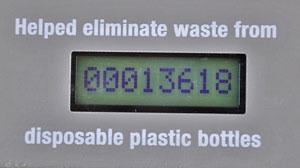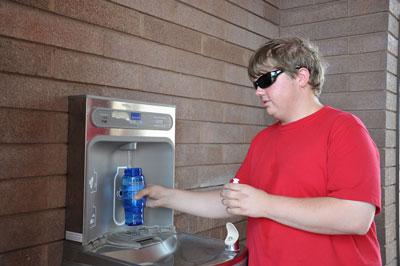Editor's note: Due to concerns from the Haws Corporation, which has trademarked the phrase "Hydration Station," this story has been edited to remove those two words as they appear back to back.
A new water-filling station at the main visitor center for Lake Mead National Recreation Area has been in service for six months, and in addition to reducing the use of disposable plastic water bottles, use of the filtered water is proving popular with visitors. Since it's installation, the station has been used to fill 13,600 water bottles.
You'd expect to find a drinking fountain at any park visitor center'especially one in the desert'and this filling station does that job nicely, plus a little more. It works just like a standard drinking fountain but also has a shelf for easy filling of water bottles. A sensor initiates the water fill, and every time a bottle is filled, that action is automatically counted and displayed on the station.
'Word is getting around that this is the place to stop and refill your water bottle, which with the heat and everything else, that's a really good message to have,' said Michelle Riter, a Lake Mead NRA district interpreter.
Riter said installation of the water-filling station at the Alan Bible Visitor Center is part of the Lake Mead NRA's Climate Friendly Parks action plan to cut down on plastic water bottle waste. This plan includes initiatives to increase visitor use of refillable water bottles, increase number of filling stations in the park and collaborate with the visitor center store to sell less expensive refillable water bottles.
Once the water-refilling station was installed, Riter said they stopped selling bottled water at the visitor center store and began selling more varieties of refillable water bottles. She said the least expensive water bottle is only $2.99 and has the Lake Mead NRA logo on it along with facts about the park.
The Vanlue family, from O'Fallon, Mo., visited the store in early August, purchased a refillable water bottle and filled it at the station. After Jacob, 17, filled up his bottle, his mom, Barbara, said she was thankful for the station and the reduction of plastic water bottle waste in landfills.

A counter automatically records how many times the water bottle portion of the station has been used. NPS photo.
It's not just popular with families and individual visitors. Gabriel Kelsey-Yoder, Western National Parks Association (WNPA) bookstore manager, said large tour groups often stop by the visitor center and have been receptive to purchasing and using the refillable water bottles. She said she has seen campground users come to refill their water bottles at the refilling station as well because they prefer the cold, filtered water.
Park visitors, especially local hikers and bicyclists who use the trails, have been spreading the news about the new refilling station by word of mouth and through social media, Riter added. They are excited to see how many water bottles have been refilled and want refilling stations to be installed in other areas of the park.
Funding for the refilling station was provided by the WNPA. The Alan Bible Visitor Center is located just of US 93 between Boulder City, Nevada, and Hoover Dam.




Comments
Ec asks, "And so what if a bottle 'didn't make it to a land fill'? Why do we have to 'start somewhere'?"
One good answer can be found in Virginia Beach, Virginia, where the highest piece of terrain for miles around is the 60-foot high "Mount Trashmore," a now-closed landfill that covers 165 acres of what would otherwise be prime real estate alongside I-264. Wonder how many homes or businesses could have been built on those 165 acres – and contributed to the economy through jobs and and an expanded tax base?
Mount Trashmore no longer accepts trash – it's long since maxed out, so the city had to open a new landfill to tie up some additional real estate. That's part of the reason the monthly trash pickup bill residents and businesses pay to the city (some might even call it a "tax") more than doubled between 2010 and 2013. According to a city councilman, the increase was due to increasing costs for trash disposal.
That same story is repeated in plenty of other locations around the country. Some would suggest that the rise in such taxes – and the loss of land that would otherwise be revenue-producing—could be slowed if we would just try a bit harder to reduce the amount of garbage that ended up in landfills, and therefore extended the life of existing sites for our trash.
Ah, but that would likely just be "chasing windmills with 'feel good' actions that have no real impact."
Tahoma,
My objection is not to the "station" (though your suggestions would provide a comparable and cheaper solution) but to the concurrent shut down of bottle water sales. I too recycle, I don't use bottled water personally on the trail and always come back with more in my pack then I left. That's what makes Lee's "entitlement" comments so funny. The fact is that this "water station" and the shut down of bottled water sales will have absolutely no impact on our "spaceship" but will inconvenience vistors and cost the park revenues.
We certainly can differ on AGW - I'm not sure we differ on pork. It (and pandering for votes) unfortunately is a disease of both parties. Only an educated voter base can fix that and if there is anything shrinking, it is an educated voter base. But then when the trend is to give out freebies, why worry about being educated.
We also differ on your fatalistic view of our future. I have far more faith in the strength of our spaceship and believe in the future, as in the past, the dire forecasts of doom will prove to be ill founded. There is plenty of room for the pie to be expanded.
Thats right Jim, there is no land in Virginia any more. LOL
If that land had a higher and better use - then someone would have paid more for it and it would have been put to that use - unless of course the government got in the way. The fact is the people that are dumping trash are paying to dump trash. They have deemed that a reasonable cost.
Not to mention - the innovation of man is turning many of the landfills into new useful real estate.
Like parks:
http://ci.champaign.il.us/departments/planning/long-range-planning/resee...
Solar electric plants:
http://www.thedailybeast.com/articles/2013/05/19/landfill-sites-find-reu...
And even your example - Mt Trashmore - now a skate park
http://earth911.com/news/2012/10/30/building-on-former-landfill-sites/2
Quit being such a pessimist. Think positive and positive things will happen.
Last year the town I lived in purchased more than 19,000 96 gallon recycle bins and gave one to each household within town limits. The cost was about $750,000 or about $40 per can. In the first year, the residents of the town recycled over 9800 tons of trash. The savings to the town was $550,000 in landfill fees. So, in two years, the cans will pay for themselves. Regular trash days are now much lighter, allowing the trucks to cover more territory. This allows for the recycling day pickup without costing the town more for additional trucks and manpower.
Our entire town started "somewhere." And it is having a positive effect on the environment and the town coffers over the long run. Yes, it is a little inconvenient, but it is obvious that most of the town doesn't mind. And it does have an impact on our "Spaceship;" there will be a little more space in it tomorrow.
As for stopping littering, I fully believe the best way to change people's behavior is to make them aware of it. If using a recyclable water bottle and filling it up at a water station makes one or two or a hundred people aware of a litter problem and aware of a need to recycle, we have won. And by the way, we are not doom and gloom people. In fact, we are the exact opposite. We just disagree with you on how to get there.
I just Googled commercial recycling and new recycling businesses and found some interesting stuff.
http://www.epa.gov/epawaste/nonhaz/municipal/index.htm
http://greenliving.lovetoknow.com/United_States_Recycling_Statistics
http://deq.mt.gov/Recycle/recycling_statistics_Page.mcpx
One of the most interesting was this one -- which points up business and job opportunities involved in recycling:
http://www.ilsr.org/recycling-means-business/
There are literally hundreds of sources dredged up by a simple Google search. But as in anything, there will be people who get aboard and prosper; others whose lives will benefit from the efforts of those who got aboard; those who will stand by and watch while they wonder what the heck is happening; and others who will miss the boat entirely as they try to protest against an idea they can't seem or won't try to comprehend.
That's interesting dahkota. In my town, recycling is voluntary. If you want the trash company to pick up your recycling in a separate recycling container you pay extra - and it ends up getting thrown in the the dump. But people feel good because they "recycled". I suspect your town is doing the same. They "saved" $550,000 in landfill fees but God knows how much they spent in "recycling" fees. If there is such money in recycling, why is the country not covered by commercial recycling operations?
Won what? Making you feel better? Making one or two hundred people out of billions hasn't accomplished a thing.
Jim, I can remember when I was hired as trails laborer in 1960 for the NPS on a trail crew in Yosemite National Park. The first thing we were assigned to do was backfill the trails on the Valley Floor by shoveling the dirt from the outside of the trail back into the center. We were issued tools and if you broke one, the most common being the shovel handle by using it to pry with, you were charged for new one,. It did not take long to learn to use tools properly and learn to care for all the equipment assigned. I disagree with EC on this point, everything we do to care for resources, be it the equipment on the job, our own homes, etc. pays off not only in savings and appearance but in reducing the wasteful and consumptive practices that exist both in the public and private sector (including what we are throwing away). This small gesture at Lake Mead is an excellent step forward.
Lee,
Not sure what your point was. I recyle. I don't pay extra to the trash company, I drive it to the local recycling center. Makes me "feel good" at no one else's expense but I do question the value. If recycling is actually a more efficient use of the resource, why would I have to pay more to my waste company for separate "recycling" when I can put the same items in my trash at no additional expense? Fabricated jobs???
But then, this thread isn't about recycling. It is about the choice of buying bottled water.
Oh, and tell us again about those higher insurance cost in non-seat belt states.